
How does MRAM work?
MRAM (magnetoresistive random access memory) operates by using two magnetic layers separated by an insulating layer. These layers can align in the same or opposite directions, altering the resistance and allowing the memory to store data as 0s and 1s. MRAM is fast, enabling data to be read and written in about 35 nanoseconds. It supports frequent writing without degradation. Additionally, it retains data when powered off and functions across a wide range of temperatures.
How is MRAM different from other non-volatile memories?
Compared to other memory types, such as battery-backed SRAM, MRAM has distinct advantages. If the SRAM battery fails, all data is lost, and its read and write capabilities are limited. In contrast, Everspin MRAM is persistent and supports unlimited read and write cycles. Ferroelectric memory, another option, performs well at low voltages but can face reliability issues at high temperatures. MRAM, however, operates reliably across a broad temperature range, preserving data safely even during unexpected power failures.
How are the two types of MRAM different?
Toggle MRAM and spin-transfer torque (STT) MRAM are distinct in their operation. In toggle MRAM, a magnetic field switches the direction of the top magnetic layer, known as the free layer, while the bottom layer remains fixed. For STT MRAM, the direction is altered by passing a current through an insulating layer between the two magnetic layers.
Toggle MRAM cannot be miniaturised extensively due to the size required to generate the magnetic field for switching. It is available in sizes ranging from 128 kilobits to 16 megabits. STT MRAM, on the other hand, can be scaled smaller with technological advancements, is available in sizes from 16 megabits to 128 megabits, and even up to 1 gigabit, making it suitable for replacing traditional RAM.
Esta historia es de la edición November 2024 de Electronics For You.
Comience su prueba gratuita de Magzter GOLD de 7 días para acceder a miles de historias premium seleccionadas y a más de 9,000 revistas y periódicos.
Ya eres suscriptor ? Conectar
Esta historia es de la edición November 2024 de Electronics For You.
Comience su prueba gratuita de Magzter GOLD de 7 días para acceder a miles de historias premium seleccionadas y a más de 9,000 revistas y periódicos.
Ya eres suscriptor? Conectar
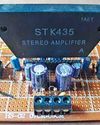
STK435 IC-Based STEREO AMPLIFIER
This stereo AF amplifier uses the STK435 IC, a highly popular choice due to its simplicity.

A SEWER DRAIN SHIELD For Smart Cities
Drainage systems are vital for storm water management but often transport pollutants, especially plastics, to rivers and oceans, harming ecosystems.

ESP32 SPEECH FUNCTION: Text To Speech
Speech capability in technology primarily has two dimensions: text to speech (TTS) and speech to text (STT). This device focuses on TTS.
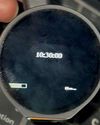
World's Smallest Programable INDUSPHONE DESIGN
This is the second part of designing the world’s smallest phone, where the UI is integrated with the basic functions of the phone.
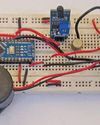
FLAME-SENSING FIRE ALARM Using An Arduino Nano
Fire safety alarms are crucial in both residential and industrial environments.
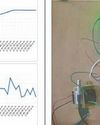
loT-Based Distribution Transformer CONDITION MONITORING SYSTEM
The proposed IoT-based distribution transformer condition monitoring system enables real-time monitoring of distribution transformers, identifying such deviations as overload conditions and overheating.

Wi-Fi 6 AND Wi-Fi 7 Powering The Next Wave of Smart Connectivity
Wi-Fi 6 leads with faster data rates and reduced latency while upcoming Wi-Fi 7's backward compatibility will facilitate gradual upgrades from Wi-Fi 6, easing transitions. However, advanced features like multi-link operation (MLO) and ultra-low latency may command a premium, making Wi-Fi 7 suited for high-end applications.

CHARGE FORWARD: High-Voltage Batteries And MSMEs Can Fuel INDIA'S EV REVOLUTION
A nuanced explanation of low- and high-voltage EV batteries by Dr Gokhale, Vice President for Battery Technology at JSW Energy, illuminates their advancements and influence. The essential role of MSMEs and academia in developing a strong EV ecosystem emerges, marking their significance for India's push towards self-reliance in this innovative field.

"MILES TO GO Before I Sleep"
A teacher illuminates the path to success through the light of knowledge, yet some teachers extend that light to society through their contributions and research. Known as the architect of the modern M3 electronic voting machine (EVM) and the voter verifiable paper audit trail (VVPAT) that transformed India's democratic process, Prof. (Dr) Rajat Moona's journey began in the modest town of Bareilly. Here is his story, as recounted to and written by EFY's Yashasvini Razdan.
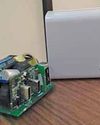
STARTUPS & INNOVATORS
1 One Charger To Charge All Your Devices | 2 Harnessing AI Technology For Efficient Pest Management | 3 Wireless Light-Based Communication With Velmenni's Technology